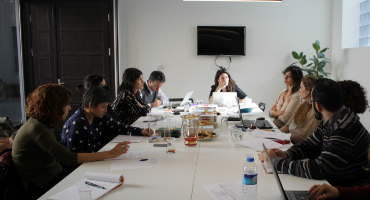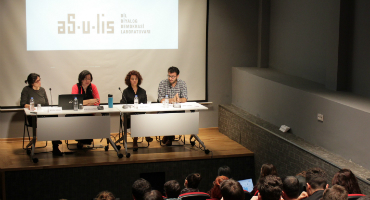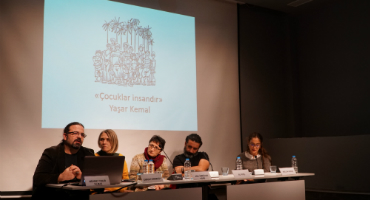On June 27, 2016, the first Asulis Educational Research Meeting was held in Hrant Dink Foundation and “needs”, “problems”, “suggestions” and “goals” in education were discussed with participants consisting of various institutions and independent researchers. In the first one of meeting series, we discussed the fundamental needs related to discrimination, discriminatory discourse and opposing discourse in education, suggestions for fulfilling these needs and the possible obstacles.
Serkan Çelik (Hacettepe University), Meral Apak (Boğaziçi University Center for Educational Policy Studies), Gözde Durmuş (Bilgi University Center for Sociology and Education Studies), Çetin Çelik (Koç University), Ayşegül Taşıtman (Sabancı University Purple Certificate Programı), Kenan Çayır (Bilgi University), Melisa Soran (Bilgi University Center for Sociology and Education Studies), Aylin Vartanyan (Boğaziçi University School of Foreign Languages), Mehmet Soycan (Another School is Possible Association), Yıldız Yalman (Another School is Possible Association), Melike Acar (Boğaziçi University Center for Educational Policy Studies), Ayşegül Bayar (Sabancı University, Purple Certificate Program), Dilek Erzurumlu (Boğaziçi University) participated in this first workshop aims to gathering ideas together.
The topics of the workshop can be categorized under four main titles and some subtitles are similar in accordance with their content. You can find a list of our discussions below:
1) NEEDS
a) Curriculum studies: Books on hate speech that can be taught in universities,
b) Collecting data: Collecting data for defining discrimination and raising awareness,
c) Methodology
• Determining target groups (teachers, parents, student, school administration, students of educational sciences) and using different methods for each group,
• Making the distinction between formal and informal education,
• Exchanging the experiences of target groups,
• Following the works on hatred and discriminatory discourse in education worldwide.
d) Common platform
• Making many target groups come together by establishing ASULIS platform and sharing the each work,
• Establishing a platform in which ideas are consistently recorded and assessment and evaluation work is carried out.
e) Collaboration with teachers
• Sharing the collected data with teachers, including the teachers to the process by feedbacks,
• Establishing a platform in which teachers can exchange their experiences through forums.
2) SUGGESTIONS
a) Common platform
• ASULIS can be a platform in which the researches in this field are shared and the institutions working in this field contact to each other. In this way, conducted researches can be joined with other complementary researches.
• Works coming together in a common platform can be grouped through word clouds.
b) Methodology and Field of Study
• The focus can be the intersections of experiences concerning discourse in media and education,
• Creative drama workshops can be organized for children and anti-discrimination attitude can be taught to children through plays,
• A process working via digital environment can be launched,
• An interdisciplinary process working through the participation of target groups (teachers, parents, student, students of educational sciences etc.) can be aimed,
• Organizations of students and teachers can be contacted,
• Materials that created a new language can be put into circulation (documentaries, movies etc.),
• Meetings with researchers conducting studies on child’s rights can be organized,
• Produced information can be circulated in international arena and an exchange of information can be realized through other projects.
c) Collaboration with teachers
• Teachers can be led to use the books prepared by ASULIS platform in the courses,
• Certificate programs can be organized with research centers for future teachers,
• Both parents and students can be contacted by conducting joint works with school counselors,
• A common online platform can be establish for teachers to contact to each other,
• With workshops for elementary school teachers, different courses of action can be created for teachers with different fields of study,
• Active participation in the forums established by the teachers can be realized.
d) Suggestions for ASULIS
• ASULIS laboratory’s focuses in the field of education can be determined with the participants,
• ASULIS laboratory’s first work in the field of education might be collecting data,
• ASULIS can be turned into a platform in which human and information resource is available for participants,
• International funds can be provided for project applications made via ASULIS,
• Through ASULIS education workshops, experiences and ideas of institutions and researches combating discrimination can be exchanged,
• Works carried out under the umbrella of ASULIS can be made visible through the platform,
• Library resources that will be collected for ASULIS laboratory can be improved and addition of new resources to ASULIS collection can be aimed,
• Educational and instructive conferences can be organized under auspices of ASULIS laboratory.
3) GOALS
• Aiming to social transformation in the process of collecting data,
• Aiming to education of the educators (contacting to faculty members in addition to curriculum of educational sciences departments),
• Organizing a joint discrimination study with teacher villages (as part of Another School is Possible project),
• Creating the necessary team work and methodology for preparing alternative textbooks,
• Presenting the alternative curriculums to teachers and making them use those alternatives as additional materials in their courses,
• Moving beyond the formal education and organizing forums where teachers can exchange their experiences of discrimination,
• Creating an active field of learning instead of cognitive and passive learning,
• Giving a voice to groups subjected to discrimination and collaborating with researchers studying on child’s rights,
• Improving the library established under the auspices of ASULIS laboratory,
• Putting the information produced under the umbrella of ASULIS into circulation in international arena through information exchange in conferences.
4) PROBLEMS
• Insufficiency of the data that was collected by academics working in the field of education, lack of sophisticated studies (problems of collecting data with surveys),
• Problems in traditional data collecting system (problems that emerge between the school and the researcher during the process etc.),
• Barriers to studies on curriculum (obstacles of Ministry of Education and course content under the initiative of educators etc.),
• Inability to complete the assessment processes of the conducted studies,
• Relationship of the academics working in the field of education with the figures in the field (not sharing the collected data with the subjected groups, not providing feedback etc.).




